Front Porch Gathering
Title: Health Disparities in Communities of Color and the Impact on Mental
April 18, 2017, Huston-Tillitson University
 As the social and economic demographics in Central Texas continue to shift, the narrative surrounding health care access, community wellness and health equity for traditionally underserved populations is both complex and consequential. Health disparities reflect the differences in health status between different groups of people, and Austin continues to see inconsistency in the health and wellness of particular communities based on location. This event focused on the idea that changes in pre-determined access, policy and practice are essential to provide all Austin residents the opportunity to achieve comprehensive and holistic health regardless of race, ethnicity, sexual orientation, income, or immigration status.
As the social and economic demographics in Central Texas continue to shift, the narrative surrounding health care access, community wellness and health equity for traditionally underserved populations is both complex and consequential. Health disparities reflect the differences in health status between different groups of people, and Austin continues to see inconsistency in the health and wellness of particular communities based on location. This event focused on the idea that changes in pre-determined access, policy and practice are essential to provide all Austin residents the opportunity to achieve comprehensive and holistic health regardless of race, ethnicity, sexual orientation, income, or immigration status.
Opportunity Forum
Title: After the Storm: Building Resilient and Equitable Communities
October 6, 2017, 12:00 pm – 1:30 pm, The University of Texas at Austin Law School Francis Auditorium (TNH 2.114) 727 E. Dean Keeton Street Austin, TX 78705
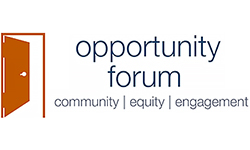 Now that the floodwaters have receded, the communities ravaged by Hurricane Harvey are beginning the long, hard road of rebuilding. Historically underserved populations—including low-income persons of color—face especially daunting challenges. What needs to be done to help the most vulnerable survivors rebuild their lives? How can we protect all residents from future flooding and exposure to other hazards? And what lessons have we learned from prior disasters to ensure that disaster recovery funds are spent more equitably and effectively? This event fostered a conversation on these questions and more, as we discussed how to build resilient and equitable communities after Hurricane Harvey.
Now that the floodwaters have receded, the communities ravaged by Hurricane Harvey are beginning the long, hard road of rebuilding. Historically underserved populations—including low-income persons of color—face especially daunting challenges. What needs to be done to help the most vulnerable survivors rebuild their lives? How can we protect all residents from future flooding and exposure to other hazards? And what lessons have we learned from prior disasters to ensure that disaster recovery funds are spent more equitably and effectively? This event fostered a conversation on these questions and more, as we discussed how to build resilient and equitable communities after Hurricane Harvey.
St. David’s CHPR Conference
Title: Health Disparities in the Precision Health Era Across the Lifespan
Wednesday, February 21, 2018 11:30-4:30, Thompson Conference Center
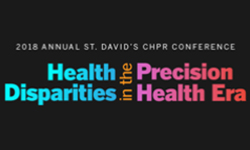 Keynote Speaker: Usha Menon, PhD, RN, FAAN, Associate Dean for Research & Global Advances, University of Arizona, College of Nursing “From the Frontline: What Does Precision Health Mean to Me?”
Keynote Speaker: Usha Menon, PhD, RN, FAAN, Associate Dean for Research & Global Advances, University of Arizona, College of Nursing “From the Frontline: What Does Precision Health Mean to Me?”
St. David’s Center for Health Promotion and Disease Prevention Research in Underserved Populations (CHPR) in collaboration with TCRSS at The University of Texas at Austin School of Nursing is hosting its 7th annual conference. This conference brings together health care experts, innovators, nursing leaders, policy makers, caregivers and industry experts who are committed to the application of emerging technologies to promote health and decrease health disparities in underserved populations. Attendees will hear speakers from around the nation discuss important and innovative topics and be able to participate in discussions with the panel.
The LaVerne Gallman Distinguished Lectureship in Nursing
Title: Health Disparities in the Era of Precision Health: Will our new tools reduce or expand the gaps?
Wednesday, April 25, 2018, 3:30 pm – 5:00 pm, The Auditorium at the Edgar A. Smith Building (Blanton Museum) 200 E. Martin Luther King Jr. Blvd. Austin, TX 78712
 Speaker: Mark R. Cullen, MD – Director, Center for Population Health Sciences, Senior Associate Dean for Research, Professor of Medicine (Primary Care and Population Health), of Biomedical Data Science, of HRP (Epidemiology) and Senior Fellow at SIEPR
Speaker: Mark R. Cullen, MD – Director, Center for Population Health Sciences, Senior Associate Dean for Research, Professor of Medicine (Primary Care and Population Health), of Biomedical Data Science, of HRP (Epidemiology) and Senior Fellow at SIEPR
Free and open to the public. A catered receiption will follow the lecture.
 These days it would be hard to name an industry that hasn’t been impacted by innovative technology resulting in greater efficiency, convenience, and affordability. Health care, however, seems to be the exception. While health care keeps getting costlier, patient outcomes have gotten worse and management of chronic conditions such as diabetes are now responsible for 80% of total spending.
These days it would be hard to name an industry that hasn’t been impacted by innovative technology resulting in greater efficiency, convenience, and affordability. Health care, however, seems to be the exception. While health care keeps getting costlier, patient outcomes have gotten worse and management of chronic conditions such as diabetes are now responsible for 80% of total spending. In this current pilot study Dr. Morrison is developing and pilot testing an innovative cognitive self-management intervention for People with Multiple Sclerosis (MS) delivered via web-based video conferencing. This will be done in two phases: Phase 1: (a) Conduct interviews with people with MS to gather data to guide the adaptation of a tailored, cognitive self-management intervention delivered via web-based video conferencing, (b) Develop an adapted version of the 8-week Memory, Attention, and Problem-Solving Skills in MS (MAPSS-MS) intervention guided by the analysis of the interview data.
In this current pilot study Dr. Morrison is developing and pilot testing an innovative cognitive self-management intervention for People with Multiple Sclerosis (MS) delivered via web-based video conferencing. This will be done in two phases: Phase 1: (a) Conduct interviews with people with MS to gather data to guide the adaptation of a tailored, cognitive self-management intervention delivered via web-based video conferencing, (b) Develop an adapted version of the 8-week Memory, Attention, and Problem-Solving Skills in MS (MAPSS-MS) intervention guided by the analysis of the interview data. Dr. Young is an expert on adolescent health with a particular focus on mental health promotion and prevention of mental illness in primary care. Her primary research has examined factors associated with the development of depressive and anxiety symptoms as well as contextual issues that impact effective treatment of mental health disorders. In this current pilot study, she is working to refine her previous successful intervention using mindfulness training (MT) and develop an integrated self-management intervention specifically designed for adolescents with Polycystic Ovary Syndrome (PCOS).
Dr. Young is an expert on adolescent health with a particular focus on mental health promotion and prevention of mental illness in primary care. Her primary research has examined factors associated with the development of depressive and anxiety symptoms as well as contextual issues that impact effective treatment of mental health disorders. In this current pilot study, she is working to refine her previous successful intervention using mindfulness training (MT) and develop an integrated self-management intervention specifically designed for adolescents with Polycystic Ovary Syndrome (PCOS). Dr. Harrison’s research interests include the intersection between age related change and impairment and its effect on social role performance and health outcomes. Her current pilot study is a mixed-methods sequential study examining the effect of self-management strategies on bio-psychosocial disablement outcomes in Mexican Americans with OA-related disabilities. This study builds on our previous 4-year ethnographic study (R01 NR010360;? PI: T. Harrison) of disability-related health disparities in Mexican Americans (MAs) with mobility impairment and expands our science to include self-management as a mechanism for intervention. This study is based on a theoretical model of disablement outcomes that was developed in our research on aging and disability. We will adapt a self-management outcome measure using qualitative data that will be refined in the quantitative portion of the study, which will include biological indicators of stress as a mechanism for co-morbidity development. The resulting explanations of outcomes will inform an intervention based on the best ways to help MAs pace themselves using assistive devices appropriate for their mobility needs. This study will lead to both an R01 and an R21 submission. First, the longitudinal testing of relationship trajectories is essential to providing a test of the wear and tear argument that explains how disablement can lead to further disease processes for people with disabilities, and how self-care management may alleviate that pathway. Second, the intervention to test self-management in a manner that will be acceptable to the MA population of men and women with disabilities, using both ethnic and gender tools, will be developed based on our findings.
Dr. Harrison’s research interests include the intersection between age related change and impairment and its effect on social role performance and health outcomes. Her current pilot study is a mixed-methods sequential study examining the effect of self-management strategies on bio-psychosocial disablement outcomes in Mexican Americans with OA-related disabilities. This study builds on our previous 4-year ethnographic study (R01 NR010360;? PI: T. Harrison) of disability-related health disparities in Mexican Americans (MAs) with mobility impairment and expands our science to include self-management as a mechanism for intervention. This study is based on a theoretical model of disablement outcomes that was developed in our research on aging and disability. We will adapt a self-management outcome measure using qualitative data that will be refined in the quantitative portion of the study, which will include biological indicators of stress as a mechanism for co-morbidity development. The resulting explanations of outcomes will inform an intervention based on the best ways to help MAs pace themselves using assistive devices appropriate for their mobility needs. This study will lead to both an R01 and an R21 submission. First, the longitudinal testing of relationship trajectories is essential to providing a test of the wear and tear argument that explains how disablement can lead to further disease processes for people with disabilities, and how self-care management may alleviate that pathway. Second, the intervention to test self-management in a manner that will be acceptable to the MA population of men and women with disabilities, using both ethnic and gender tools, will be developed based on our findings. Dr. Cuevas’ research interests include diabetes self-management in underserved populations with a focus on cognitive function. In her current pilot study she is testing the feasibility of a cognitive training intervention for people with diabetes. Development included (1) adaptation of prior established, tested interventions; (2) interviews with stakeholders; and (3) integration of course content based on the established interventions and interviews. This intervention addresses diabetes self-management, complications of diabetes, and cognitive functioning. It is an 8-week cognitive rehabilitation training program that combines group sessions for increasing knowledge and building self-efficacy for new cognitive compensatory strategies with individual home-based online practice of those skills. This study forms the basis for a subsequent project to expand the findings by examining the effects of cognitive training on self-management adherence and neural activity.
Dr. Cuevas’ research interests include diabetes self-management in underserved populations with a focus on cognitive function. In her current pilot study she is testing the feasibility of a cognitive training intervention for people with diabetes. Development included (1) adaptation of prior established, tested interventions; (2) interviews with stakeholders; and (3) integration of course content based on the established interventions and interviews. This intervention addresses diabetes self-management, complications of diabetes, and cognitive functioning. It is an 8-week cognitive rehabilitation training program that combines group sessions for increasing knowledge and building self-efficacy for new cognitive compensatory strategies with individual home-based online practice of those skills. This study forms the basis for a subsequent project to expand the findings by examining the effects of cognitive training on self-management adherence and neural activity. Today, healthcare is at a defining moment, at the heart of macro-social transformation. U.S. demographics are radically shifting, and technological advances are spreading rapidly and widely. The core conditions of people’s daily lives are changing as well. It is thus difficult, for example, to ignore the remarkable penetration of new, persuasive technology into modern daily life, not only by commercial technological giants such as Amazon and Facebook, but also by small online merchants.
Today, healthcare is at a defining moment, at the heart of macro-social transformation. U.S. demographics are radically shifting, and technological advances are spreading rapidly and widely. The core conditions of people’s daily lives are changing as well. It is thus difficult, for example, to ignore the remarkable penetration of new, persuasive technology into modern daily life, not only by commercial technological giants such as Amazon and Facebook, but also by small online merchants.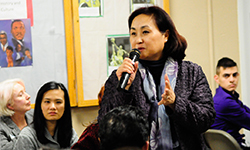 This dialogue continued the conversation on the reginal health disparities in Travis County that was started nine months earlier. This time TCRSS Director Dr. Miyong Kim moderated a mixed panel of UT faculty and community organization leaders who each shared their expertise in the areas of research data, current resources, successful programs, and the social determinants of maternal, infant health. This brought some new perspectives to the table as well as a bit more specificity on what kind of long term effects these disparities have on a community. The Audience was engaged and showed a lot of interest in this issue and were eager to discuss ideas for action.
This dialogue continued the conversation on the reginal health disparities in Travis County that was started nine months earlier. This time TCRSS Director Dr. Miyong Kim moderated a mixed panel of UT faculty and community organization leaders who each shared their expertise in the areas of research data, current resources, successful programs, and the social determinants of maternal, infant health. This brought some new perspectives to the table as well as a bit more specificity on what kind of long term effects these disparities have on a community. The Audience was engaged and showed a lot of interest in this issue and were eager to discuss ideas for action. After beating stage IV kidney cancer in 2007 Richard Davies deBronkart known widely as “e-patient Dave” became a blogger, health policy advisor and international keynote speaker. He is now one of the world’s leading advocates for patient engagement. Urging patients to educate themselves and share knowledge with one another, while urging doctors to collaborate with patients. He believes informed self-care is critical for better health and makes for a richer, more collaborative partnership between physicians and their patients. This message was received by a multi-disciplinary audience of over 200 students, staff, faculty, alumni, and community members.
After beating stage IV kidney cancer in 2007 Richard Davies deBronkart known widely as “e-patient Dave” became a blogger, health policy advisor and international keynote speaker. He is now one of the world’s leading advocates for patient engagement. Urging patients to educate themselves and share knowledge with one another, while urging doctors to collaborate with patients. He believes informed self-care is critical for better health and makes for a richer, more collaborative partnership between physicians and their patients. This message was received by a multi-disciplinary audience of over 200 students, staff, faculty, alumni, and community members.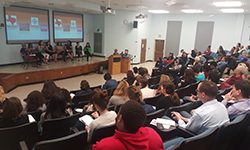 This event was a follow up to our previous community engagement forum focusing on health disparities in Austin/Travis County. This Dialogue was held at Huston-Tillotson University and attended by over 100 members of the community including city council members, health workers, students, and leaders of other CBO’s. This talk show style dialogue included a panel of representatives from
This event was a follow up to our previous community engagement forum focusing on health disparities in Austin/Travis County. This Dialogue was held at Huston-Tillotson University and attended by over 100 members of the community including city council members, health workers, students, and leaders of other CBO’s. This talk show style dialogue included a panel of representatives from 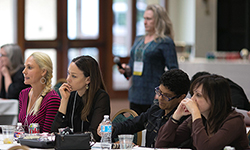 TCRSS was a proud co-sponsor of this year’s St. David’s CHPR conference focusing on the built environment and its influence on our health. Keynote speaker, Dr. Linda Mc Cauley, Dean of the Emory University Nell Hodgson Woodruff School of Nursing, brought her expertise on environmental and occupational health and shared results from her interdisciplinary study using participatory research models to study pesticide exposure among minority communities. This half-day event included poster presentations and highlighted the many transdisciplinary collaborative opportunities among researchers interested in health and the environment.
TCRSS was a proud co-sponsor of this year’s St. David’s CHPR conference focusing on the built environment and its influence on our health. Keynote speaker, Dr. Linda Mc Cauley, Dean of the Emory University Nell Hodgson Woodruff School of Nursing, brought her expertise on environmental and occupational health and shared results from her interdisciplinary study using participatory research models to study pesticide exposure among minority communities. This half-day event included poster presentations and highlighted the many transdisciplinary collaborative opportunities among researchers interested in health and the environment.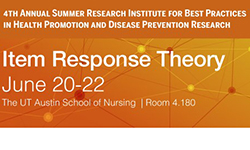 Our 4th annual Summer Research Institute for Best Practices in Health Promotion and Disease Prevention Research focused on Item Response Theory. To unpack the nuts and bolts of this complex concept we invited two very distinguished experts on the subject. Dr. Kitty Chan from Johns Hopkins Bloomberg School of Public Health who’s research focuses on measurement issues, particularly the application of phychometric techniques using IRT for the study of mental health, and Dr. Tam Nguyen from Boston College’s William F. Connell School of Nursing who also uses psychometrics to study health promotion/disease prevention in vulnerable/hard to reach populations. Over the course of this two and a half day workshop, these talented researchers led a group of 24 mostly nursing PhD students and a few faculty through IRT framework of modern measurement and improved scales using computer adaptive testing that can raise quality and efficiency while reducing respondent burden.
Our 4th annual Summer Research Institute for Best Practices in Health Promotion and Disease Prevention Research focused on Item Response Theory. To unpack the nuts and bolts of this complex concept we invited two very distinguished experts on the subject. Dr. Kitty Chan from Johns Hopkins Bloomberg School of Public Health who’s research focuses on measurement issues, particularly the application of phychometric techniques using IRT for the study of mental health, and Dr. Tam Nguyen from Boston College’s William F. Connell School of Nursing who also uses psychometrics to study health promotion/disease prevention in vulnerable/hard to reach populations. Over the course of this two and a half day workshop, these talented researchers led a group of 24 mostly nursing PhD students and a few faculty through IRT framework of modern measurement and improved scales using computer adaptive testing that can raise quality and efficiency while reducing respondent burden. TCRSS participated in the launch of the Office of Sustainability’s Green Offices Program. The program is a points-based certification process that empowers members of UT faculty and staff to elicit change in their workspace. The student-led program, within the
TCRSS participated in the launch of the Office of Sustainability’s Green Offices Program. The program is a points-based certification process that empowers members of UT faculty and staff to elicit change in their workspace. The student-led program, within the  The program also asked each participating office to designate a Green Office Steward to serve as the office’s representative and champion of the program. Our Center Coordinator Kelli Anne Royse was up to the task and quickly began going down the checklist and implementing both operational and cultural changes toward more sustainable practices. When the 4 month program ended, we had earned 84 points achieving the Gold level of certification!
The program also asked each participating office to designate a Green Office Steward to serve as the office’s representative and champion of the program. Our Center Coordinator Kelli Anne Royse was up to the task and quickly began going down the checklist and implementing both operational and cultural changes toward more sustainable practices. When the 4 month program ended, we had earned 84 points achieving the Gold level of certification!